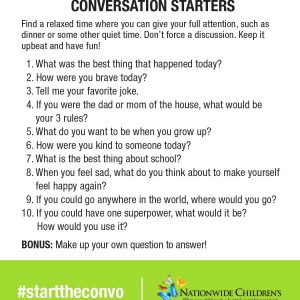All children will experience stress, failures and trauma throughout their lifetime. And although we may want to do our best to shield our kids from these emotional hardships, the truth is, we really can’t. But what we can do is provide them with the tools they need to respond to challenging situations.
The ability to thrive and overcome adversity, trauma and tragedy is known as resilience. And the great thing is, we can all develop resilience as we grow older. Ask yourself, when something bad happens, do you see it as a catastrophe only, or as an opportunity to learn, grow or overcome? Someone with high resilience would likely see both, and have the ability to thrive during both good and bad situations.
There are many factors that contribute to building up resilience, including behaviors, actions and planning – all of which are learned over time. Being resilient contributes to being successful in many aspects of life.
So how do we help kids increase these important skills?
First, we know that the Adverse Childhood Experiences (ACE) Study indicates two critical factors to building resilience:
- The presence of a caring, stable adult
- Being raised in a safe, stable and nurturing environment
First, let’s focus on how to create a safe and stable environment. This involves working to build a solid relationship with a child, which is often done by using open communication and developing trust. Take a moment to think about where you’re at in your own journey of resilience. Know that this exists on a spectrum and everyone is different.
Here are a few tips for building resilience in children and teens:
Foster Healthy Relationships
This starts with building a strong network of support for a child. Teach them the importance of making friends. Interacting with friends can allow a child to develop complex emotions, such as showing empathy and support. If a child is in school, make sure to ask if they feel comfortable going to a teacher or trusted adult with a problem they might be experiencing.
Develop Routines
Maintaining a daily routine is key for children. Younger children crave structure and predictability. Encourage a child to help contribute by asking them when they would like to brush their teeth, eat dinner, have quiet time or play outside.
Ask Open-Ended Questions
Communicating openly about scenarios can help a child learn about problem solving as well as setting boundaries. Resilient kids feel a sense of voice and empowerment to make the right decisions. Do this by asking open-ended questions, opposed to yes-or-no questions. Nationwide Children’s Hospital put together a 10-question graphic to help you get started:

Emphasize Importance of Contributions
Understanding the importance of personal contribution can help a child feel a sense of purpose and motivation. This can be as simple as asking them to help make dinner, clean up around the house, or giving back to a local charity. Offer praise for small (and large) successes and accomplishments to encourage this behavior in the future.
Teach Healthy Coping Skills
Learning to cope effectively with stress will help children overcome life’s many hurdles. We know that kids might say “no” when they are told to stop doing something, and often get even more upset. Telling a child to stop negative behavior isn’t effective. Rather, try giving them several options. Allowing a child to choose gives them a sense of empowerment and control.
If you know that a child is going through a tough situation, let them know that their feelings are valid and normal, especially feelings of sadness or guilt. Consider teaching a child to journal about their feelings, or to have them chat with another safe adult about them. The importance of a safe, stable adult in a child’s life is to demonstrate active listening skills, and not try to fix the problem for the child, but rather walk with them on their journey.
The reality is that there will always be stress in our lives. Even if we can’t control what is happening, we can control how we choose to react. And our reactions are determined by resilience and coping skills.
To learn more about helping kids set appropriate boundaries, visit https://wherestheline.info/talk-with-your-kids-about-boundaries-safety-using-what-if-game/.
Resources
- The National Child Traumatic Stress Network (NCTSN)
http://www.nctsn.org/
- Adverse Childhood Experiences (ACE) Study
https://www.cdc.gov/violenceprevention/childabuseandneglect/acestudy/index.html
- Lauren’s Kids
Trusted Triangle

Leave a Response